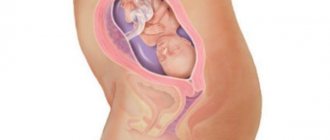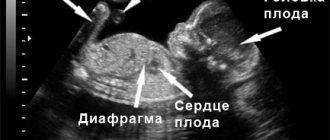Even 20 years ago, it was believed that communication with newborn children ends with “changed, fed, put to bed,” and conversations with children who had not yet been born were completely mistaken for madness.
However, today everything has changed radically. Prenatal psychologists assure that parents can begin communicating with their baby as early as 6 weeks of the mother’s pregnancy, since he already has a heartbeat and sensory organs. And from 18 weeks, the baby perfectly hears voices from the outside and reacts to them accordingly.
Modern doctors and psychoanalysts now have no doubt: the sooner mom and dad establish contact with the unborn child, the better and easier they will get used to the role of parents after his birth.
And in this case, it will be much easier to cope with a newborn baby - the baby will learn to obey his parents and will respect their feelings much faster. We will now tell you how to establish a connection with the baby who is still in your tummy...
What determines the frequency of fetal movements?
The frequency of movements the baby makes depends on many factors. Conventionally, they can be divided into physiological and abnormal.
Physiological ones include:
- emerging character;
- desire to eat;
- mother staying in a stuffy room;
- presence of loud bass in the room. For example, when listening to high frequency music;
- the mother's position is comfortable or uncomfortable for the child.
Smooth, painless kicks are an indicator of the baby’s normal well-being. Their number depends on the duration of pregnancy and the length of motherhood.
From abnormal reasons:
- acute hypoxia;
- threat of premature labor;
- polyhydramnios;
- infection.
The tremors are rough and painful; in later stages, a pathological process can be suspected based on the baby’s violent behavior. However, the cause of activity or lull can be determined after consulting a doctor and ultrasound examination.
In the first trimester, there are no tremors due to the baby’s small height and weight.
In the second trimester, starting from the 18th week, the first weak movements appear, intensifying as pregnancy progresses. From 24 weeks the baby is active.
At the end of the second trimester, the mother is able to control the movements of the fetus by stroking the belly and talking to the unborn child.
During the trimester, activity gradually fades away - the fetus grows, enlarges and it is difficult and tight for it to make movements, but they do not disappear completely.
The child has a clearly developed wakefulness and sleep pattern.
Lifestyle of an expectant mother
The baby in the belly, willy-nilly, forces a woman to reconsider her entire lifestyle and make the necessary adjustments to it:
- First of all, the expectant mother needs to get a good night's sleep, at least 8-9 hours a day. If you feel that this time is not enough, then feel free to allow yourself an extra hour of sleep during the day;
- remove from your daily routine the habit of carrying heavy bags with anything, this can provoke premature birth;
- keep the room clean, try to ventilate the apartment more often and do wet cleaning;
- wear clothes in accordance with the temperature outside, do not show off in a mini dress in the cold, all this can adversely affect the child;
- eliminate alcohol and cigarettes from your life, also do not be a passive smoker and stay away from places where they smoke;
- Take any medications in advance by agreeing with your doctor, who will probably tell you whether these pills will harm your baby;
- It is better to wear underwear made of cotton fabrics.
By following these simple recommendations, you can make sure that the baby in your belly grows healthy, strong and comes into our big world right on time! Good luck with your pregnancy and easy birth!
Author of the article: Kurakhmaeva Irina Nikolaevna.
Norms and control over the child’s movements
From the 24th week of gestation, the average fetal kicks are 10-15 times a day.
Active movements appear in the afternoon, and often at night.
Sleep is 18 hours, and the duration of 1 sleep period is from 3 to 4 hours. At this time, the baby makes a minimum number of movements that the woman does not feel.
You can monitor the number of fetal movements yourself. There is a whole scheme for this.
- Keep a diary for notes;
- Starting at 28 weeks, perform a movement test.
The essence of the method is to count 10 fetal movements twice a day. From 9am to 9pm, and from 9pm to 9am. The test can be performed daily.
Example, the first fetal activity is at 9.20, then at 11.40, 3 - at 12.15, etc. 10 movement - at 17.35 - 1 part of the test is over, the table indicates 2 times 9.20 and 17.35. The second part of the test is counting from 9 pm to 9 am.
According to this technique, constant monitoring of the baby’s activity is possible. An alarm signal is a complete absence of movement for 12 hours, or excessive activity.
The bigger the baby gets, the stronger its movements, and it feels like the baby is dancing in the womb.
Such frequent occurrences indicate a pathological course of pregnancy.
Does it move or did it seem?
The fetus begins to move in the mother's womb while still an embryo, almost from the moment of birth. He turns over and tumbles almost continuously, but the expectant mother does not feel the movements as long as his muscles are thin and weak. When their size and strength increase, the woman begins to feel a barely audible and tender trembling within herself. The fetus first makes itself felt at various stages of pregnancy. It depends on the condition and physiological characteristics of the expectant mother. Women expecting their first child may feel fetal movements between 20 and 22 weeks of pregnancy . Those who have already given birth can feel this earlier - from 16 weeks . Their uterine muscles are more stretched, and fetal movements are more clearly audible.
What to do if there is no movement, and why the baby does not move in the stomach
The absence of movements heard by the mother does not indicate that the baby is not active. Quite often, movements are recorded on ultrasound, but for some reason the mother does not feel them.
There are ways to “wake up” your baby:
- Pat the belly with patting movements. If the pregnancy is over 28 weeks, the baby understands the warmth from touch and pushes to the place where the hand of mom or dad is located.
- You can enjoy the sweet hour with a chocolate bar or chocolates. The glucose present enters the baby's bloodstream and will cause his activity, but sometimes this method is ineffective.
- A glass of cold water should cause a change in internal temperature and provoke the baby to move.
- Play loud music that your child likes.
If it is not possible to induce fetal activity for two or more hours, you should go for a consultation with an obstetrician-gynecologist. He will be able to listen to the fetal heartbeat and measure its activity using a CTG machine.
The most terrible reason for the absence of tremors is intrauterine fetal death.
Method No. 2. Conversations with your baby
The second very effective way to communicate with your baby is talking. Chat with your baby, tell him how your day was, what interesting things happened to you, what funny moments you had. Tell your child about his dad, close relatives, brothers and sisters, if any.
Very soon the child will begin to recognize his mother’s voice and will respond to such communication. The baby will also learn to distinguish dad's voice from other voices.
Moreover, scientists have proven that a child reacts better to low voices, as he hears them more clearly. Therefore, if you need to calm the baby in his tummy or encourage him to be active, let the future dad talk to the baby.
And, remember that children very early learn to distinguish the meaning of what is said, but not because they understand speech, but because they are able to distinguish the emotional coloring of words and phrases. This is why pregnant women should not be in the center of conflicts and scandals; they should not participate in disputes and quarrels themselves.
If a mother quarrels with someone, the baby feels her negative attitude, and stress hormones that are released in the mother’s blood are transmitted to him. You don’t want your child to worry, get upset and nervous along with you? Then there is no need to test it in this way.
And take into account the fact that if the expectant mother has constant conflicts with some person, the baby after birth may automatically have a negative attitude towards this person. And all because he recognizes his voice and associates it with negative experiences in the womb. It will be very difficult to break such a psychological attitude.
But talking about good things will allow the baby to grow into a positive and happy person while still in his mother’s tummy. Tell your child how much you look forward to meeting him, how long you have wanted him to be born to you, how much you love him.
If you have chosen a name for your baby, you can use it during conversations, explaining to the baby that this is his name. This will allow the child to quickly get used to his name after birth, and in some cases, scientists have recorded that recently born babies responded to their name literally a month after birth.
In addition, stories about love will help the baby not be afraid of the outside world, he will understand that everyone is waiting for his birth and is ready to surround him with affection and care, so during childbirth the child will feel calmer.
Statistics show that children with whom they often talked a lot before birth come into this world easier and faster than their peers whose parents did not talk about love.
Method number 3. Explain to your child what is happening
Of course, during 9 months of pregnancy, different situations will happen to the expectant mother, and not always good ones. Therefore, it is unlikely that it will be possible to protect the baby 100% from the negative emotions of the mother.
Your task is to explain to your baby what is happening to you, reassure him and let him know that soon everything will be over, and you will live happily and carefree again. Do not frighten the baby with long depressions, tears and negative thoughts. Otherwise, he may suffer from uncertainty and pessimism in childhood, and, possibly, in adulthood.
Stress hormones enter the baby’s bloodstream through the mother’s blood and also affect him. Therefore, when mom feels bad, the baby also feels bad in the tummy. The task of those around her is to calm the pregnant woman down and quickly return her to a good mood so that the hormones of joy begin to act. That's why they say pregnant women shouldn't be nervous.
If you teach the baby in your tummy to calmly deal with negative situations and get out of stress easily, then after birth it will be much easier for him to experience unpleasant situations.
Causes of fading
A frozen pregnancy, regardless of gestational age, must be removed. In the early stages - curettage, in later stages - artificial birth with the help of hormone therapy. The reasons for pregnancy failure are different; they are classified according to the timing of development.
In the first trimester
- chromosomal abnormalities;
- violations in the laying of genetic material;
- maternal infectious diseases;
- alcohol addiction;
- smoking and drug addiction;
- hereditary diseases;
- chronic pathological processes.
It is possible to unambiguously identify the cause of fetal death in the first trimester using a histological examination of a biopsy of the placenta and the fetus itself.
In the early stages, a miscarriage occurs when the fertilized egg is rejected. The most common culprit is hormonal imbalance.
In subsequent trimesters
- Infectious processes, in particular sexually transmitted ones;
- Acute fetal hypoxia. These include: entanglement with the umbilical artery, oligohydramnios, polyhydramnios;
- Rh conflict with the development of severe anemia;
- cardiac pathologies, especially those that poorly supply blood to the fetal heart muscle;
- genetic diseases;
- Endocrine disorders (thyrotoxicosis, diabetes mellitus).
The main cause can be identified after ultrasound diagnostics and pathological examination of post-mortem biomaterial.
If the baby doesn’t move much in the womb, there are several reasons:
- Short term;
- Fullness of a woman;
- Problems with the baby's health.
How does the child react?
There is a huge bond between a woman and her child. The baby reacts to changes in the mother's mood. If trouble happens, he will also worry about it. For this reason, during pregnancy there is no need to worry about trifles. After all, a child cries only with his mother, so you should avoid tears. If the mother is in a great mood, she feels joy, then the baby feels good. Despite the fact that the child is still in the womb, he knows how to smile and have fun. But the baby feels not only joy and happiness. He also reacts to stressful situations and sadness. If the mother is depressed, her mood worsens, and the hormone cortisol enters the bloodstream, which reaches the fetus. In such a situation, few people suspect what the child feels in the womb. But his mood also worsens, causing him to feel sad and even start crying. This has been proven by scientists.
Symptoms
- complete absence of fetal movements throughout the day;
- pain in the lower abdomen;
- frequent urge to go to the toilet;
- the appearance of bloody discharge;
- feeling of nausea with bouts of vomiting;
- rise in temperature;
- soreness of the mammary glands.
On examination, the abdomen is stony and there is no heartbeat in the fetus. Ultrasound examination confirms death.
Pregnancy from the inside: what the baby does in the tummy
Have you ever wondered what your baby does when he is in your tummy?
Do you think he’s just sleeping, floating in the amniotic fluid, only occasionally turning around to make himself known?
The actions of an as yet unborn baby are much more varied. And he begins to move from the 7th week of pregnancy, and this with a height of only 8 millimeters!
Hand movements
The baby's first movements (still weak) appear at the 7th week, and already at the 9th week of pregnancy he begins to move his arms, legs or turn his head. When the baby is about 10 weeks old, he already touches his face, ears, hands, and tries to grab the umbilical cord or genitals.
At 12 weeks, the baby begins to clench and unclench his fists, and a little later he will be able to control the independent movements of each finger. This is how he trains his developing motor system and fine motor skills of his hands.
Such a tasty thumb
Bad habits appear in a person even before he is born. Ultrasound data show that the baby begins to suck his thumb as early as 10-12 weeks. 90% of babies like the finger on the right hand.
Interesting fact . In 2007, scientists from the University of Texas conducted a study that showed that all 10-12 year old children who sucked their right thumb in the womb became right-handed. The same children who fell in love with the left finger more became left-handed.
Facial expressions
The baby learns to express his emotions in the womb, but his facial expressions develop quite late. Only at the 24th week of pregnancy can individual facial movements be distinguished. By the 36th week of pregnancy, as a result of the coordinated work of several individual facial muscles, full-fledged facial expressions are formed. The baby may smile or frown, or even stick out his tongue (the little tease grows).
We stretch and yawn
You didn’t think or guess, but the baby, meanwhile, began to yawn. Yawning appears around the 10th week, and from the 24th week of pregnancy it turns into a habit, and the baby yawns several times a day. By the end of the prenatal period, yawning practically stops.
Reflexively, when yawning, the baby begins to stretch (you also like to do this). By the way, such actions do not mean at all that the baby wants to sleep; he can yawn in his sleep.
A future mother-forum member writes : “I read that a late-term baby can yawn up to six times an hour. Moreover, this is not just an involuntary opening of the mouth, but actually a yawn. Scientists performed a 4D ultrasound on some mother. And in the future, supposedly, by yawning it will be possible to determine the level of development of a child in the womb. I wonder how this will happen?
Yawning is associated with the development of the baby's central nervous system . In the early stages, the frequency of such actions directly reflects the degree of brain maturity. It is not yet entirely clear why a baby needs yawning (as well as an adult), but there are several theories. There are opinions that yawning occurs in response to an increase in the concentration of carbon dioxide in the blood or an increase in the flow of venous blood to the baby’s heart. Some scientists argue that yawning is responsible for thermoregulation or trains jaw movements.
Drink and write
At the 19th week of pregnancy, the baby begins to drink amniotic fluid, and swallowing movements appear. Then he can already fully sense the taste. really likes sweets : in response to the favorite taste, the frequency of swallowing contractions increases, and in response to sour and bitter ones, it decreases.
The bladder fills and empties from time to time, its contents are released into the amniotic fluid, and the placenta performs the excretory function. There is a hypothesis that the baby can regulate the volume of amniotic fluid by swallowing it.
Eye movements
The baby's eyeballs have been moving since the 14th week of pregnancy. At first these are only slow changes in the eyes, but from 16-18 weeks there are already confident and rapid movements. Moreover, the baby’s body is already so smart that it does not allow its organs to be active at the same time. Therefore, periods of activity alternate with rest. While the baby is actively breathing or his heart is beating too quickly (you never know what interests him so much), his eyes are resting.
Sleep - wakefulness
The baby in your womb does not sleep all the time, sometimes he even opens his eyes. It has three phases of activity : REM sleep (occupies 41.4% of the time), slow wave sleep (53%) and wakefulness (5.6%).
The alternation of periods of activity and “rest” does not depend on the time of day or the condition of the mother. The REM sleep phase is considered the most important for baby's brain development. It is needed for the formation of nerve connections and for the normal development of the nervous system.
Breathing movements
Now the baby breathes through the placenta without using his lungs. Starting from the 10th week of pregnancy, he breathes quite quickly (40-70 movements per minute), preparing for breathing with the help of his lungs. Towards the end of pregnancy, these movements become more rhythmic, although at some points they may be completely absent for up to 30 minutes.
Hiccups
The most unusual feeling for an expectant mother is when her baby hiccups. It can appear in the 9th week of development, but most often during the third trimester of pregnancy.
Sometimes the baby hiccups several times a day, and the duration of the attack can be 10-20 minutes. Hiccups usually occur when too much amniotic fluid enters the lungs, causing the diaphragm to become irritated and begin to contract rhythmically. Sometimes researchers associate the appearance of hiccups with a lack of oxygen in the baby.
Ilona Svizhevskaya, gynecologist : “Hiccups are not at all dangerous for either the baby or the mother. During pregnancy, when the baby hiccups, the mother may feel weak and even dizzy - you don’t need to think that the hiccups are to blame, maybe your body is simply weakened and it needs vitamins. When the baby is born, he will continue to hiccup for some time, because the activity of the nervous system of the internal organs is not yet complete.”
Now you know what the baby is doing during these 40 weeks of pregnancy. You can relax, tune in to a positive wave and wait for the birth of a new life. Have an easy birth!
Read also: Trimesters of pregnancy: how the baby develops
Diagnostics
If the child does not move, what should you do - run to the clinic, or call an ambulance and go urgently to the emergency department of gynecology and obstetric pathology.
If a woman does not feel the baby in the womb, this does not mean that the child has already died. In some situations, emergency delivery saves the baby's life.
In order to establish the reasons for the lack of movement, cardiotocography is performed - if the “heart” is not detected, an emergency ultrasound is performed. It is at this stage that the sequence of actions of the medical staff is determined.
Antenatal fetal death is the death of a baby in the womb. The fetus and its location will not leave the uterine cavity on its own, so the woman will have to endure the birth of a still child.
Delay in this case could cost the mother’s life.
The type of delivery is selected individually depending on the gestational age. Preference is given to natural childbirth, but in some cases a caesarean section is performed.
Method number 4. Listen to your favorite music, sing, dance
There is no doubt that babies in their tummy can perceive melodies by ear, feel their tonality and rhythm. Children are afraid of loud and heavy sounds, but they like melodic compositions.
Doctors advise expectant mothers to listen to the classics more often - Mozart, Vivaldi, Salieri. Classic melodies calm you down and put you in a positive mood, but it’s better to avoid rock compositions.
In any case, you need to choose those melodies and songs that the mother loves - this way the positive emotions from listening will be transferred to the baby, and he will also love such music.
A number of studies have shown that babies recognize frequently listened to melodies well after birth. If they hear someone playing somewhere, someone singing a song familiar to them from prenatal development, they will recognize it and begin to react actively.
There has even been a recorded case in the world when a boy, who began learning to play the piano as a child, suddenly, unexpectedly for everyone, clearly played one melody.
Then it turned out that his mother, being pregnant, played this melody on the piano every day, the baby really liked it, he remembered its tonality, rhythm, literally from the notes. Therefore, when the boy was born, grew up, learned all the notes and began to play, he quickly played a familiar tune, even without special training for it.
If you don’t believe this story, try listening to your favorite song every day as an experiment, and after the baby is born, turn on this song and look at his reaction. Mother’s lullabies “work” in a similar way, which she sings to the baby even before birth. Mothers who have taught their babies to fall asleep to a certain lullaby while still in the womb, then easily put their already born babies to sleep with the same lullaby.
Light dancing won't hurt either, if mom loves to dance. Rhythmic movements with a positive attitude will speed up blood circulation in the body of the expectant mother, improve the supply of oxygen to tissues and promote the release of serotonin. All these factors will undoubtedly benefit the baby in your tummy.
He will love his mother's dancing and will happily join his mother when he is born and grows up a little. And do not forget that the talents of parents are very often inherited by children. Therefore, if you are a creative person, then your child will probably also grow up to be a creative person.
First weeks
In the first week, the baby is a collection of cells; by the seventh day, the unborn child is a lump of hundreds of cells. Now this is called a zygote. Moreover, every day the cells divide more and faster.
The second week is not yet an actual pregnancy, although the unborn baby is attached to the wall of the uterus, now the follicle is maturing, after this stage it will be decided whether the woman will be able to bear a child or not.
From the third to the twelfth week there is an embryonic period; only in the fourth week can a girl notice the absence of menstruation and some changes (drowsiness, toxicosis, loss of appetite and others) associated with pregnancy. Now the test will one hundred percent confirm the fact of pregnancy.
Transverse presentation
View gallery
If the fetus lies transversely, from the twentieth week of pregnancy the doctor will tell you his verdict; in this position, the head is on one side and the butt is on the other. Why is this presentation dangerous? Previously, doctors could correct the child's position by directing him in the right direction, but it required a lot of work and patience, and a caesarean section was very dangerous. Now doctors are playing it safe by immediately sending the woman in labor for surgery. There is an exception in this case: twins, when one child is located across. In this case, the second fetus has the opportunity to turn around correctly, using the free space.
Hiccups as an option for active baby movement
Many women mistake baby hiccups for movements. Hiccups in babies occur during the process of swallowing uterine fluids. There are several options why this happens:
- the baby is preparing to breathe on his own;
- lack of oxygen;
- ingestion of amniotic fluid.
Similar methods will help calm the baby: a walk, fresh air and a change in body position. By the way, a large amount of sweets in the mother’s diet makes the uterine waters taste sweet. The baby swallows them, resulting in hiccups. Therefore, it is better to avoid sweets, especially before bedtime.
So, walks, calmness and positive emotions, as well as a healthy lifestyle and proper nutrition have a beneficial effect on the well-being of the baby and mommy, respectively . After all, if the baby moves within normal limits, then he feels good. And when the child feels good, then the mother does not experience discomfort.











